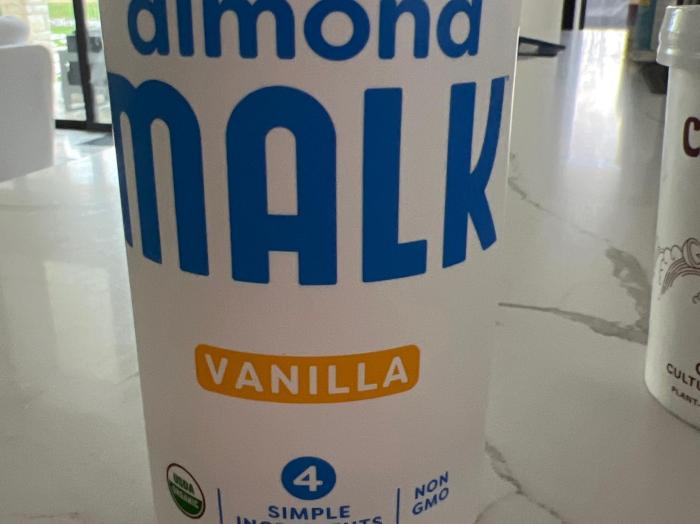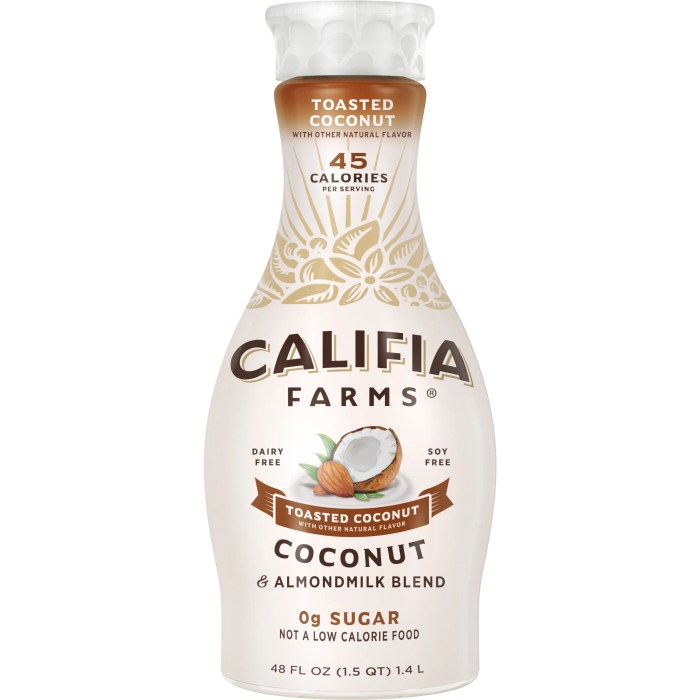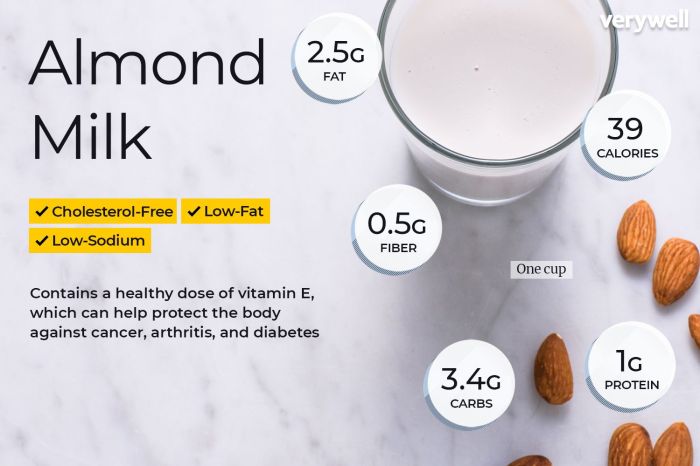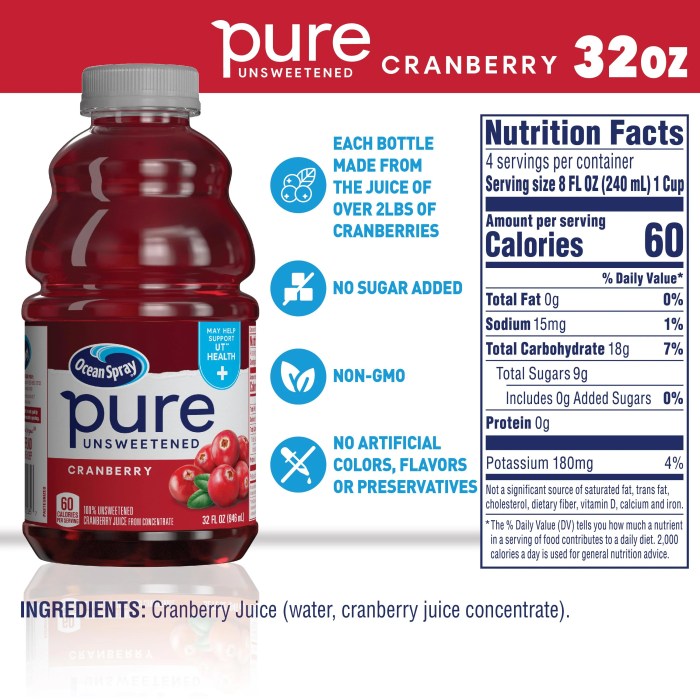Impact of Ingredients on Nutritional Value: Almond Vanilla Milk Nutrition Facts

Almond vanilla milk nutrition facts – The nutritional profile of almond vanilla milk is significantly influenced by the addition of various ingredients and the manufacturing process. Understanding these factors allows consumers to make informed choices based on their individual dietary needs and preferences. The primary components impacting nutritional value are the addition of sweeteners and vanilla flavoring, as well as the processing techniques employed.The addition of sweeteners, such as sugar or high-fructose corn syrup, substantially increases the calorie and sugar content of almond vanilla milk.
This can have implications for weight management and increase the risk of developing conditions such as type 2 diabetes, especially with consistent consumption of high-sugar beverages. Vanilla flavoring itself typically adds minimal calories and nutrients, although the specific composition of the flavoring may vary. Some artificial flavorings may contain additives that raise concerns for certain individuals, though generally, the amounts are negligible in relation to other nutritional aspects.
Sweetener Impact on Nutritional Content
Unsweetened almond milk provides a significantly lower calorie and sugar content compared to its sweetened counterparts. For example, a typical serving of unsweetened almond milk might contain around 30 calories and 1 gram of sugar, whereas a sweetened version could contain upwards of 100 calories and 10 grams of sugar or more. This difference is primarily attributed to the added sugars.
Consumers seeking to minimize sugar intake should opt for unsweetened varieties and potentially add their own natural sweeteners like stevia or a small amount of honey, allowing for better control over the overall sugar content.
Processing Methods and Nutritional Profile
The processing methods employed during almond milk manufacturing can affect its nutritional content. For instance, high-heat pasteurization, while ensuring safety, can potentially reduce the concentration of certain heat-sensitive vitamins and nutrients. Some manufacturers may also add vitamins and minerals to fortify their products, thus offsetting potential losses during processing. The addition of stabilizers and emulsifiers to enhance texture and shelf life can also slightly alter the overall nutritional composition, though these additives are generally present in small amounts.
Consumers interested in maximizing nutrient retention might consider seeking out brands that utilize gentler processing techniques or focus on minimally processed options.
Health Implications and Considerations

Almond vanilla milk, like any food product, presents both potential benefits and drawbacks when incorporated into a regular diet. Understanding its nutritional profile and potential impact on individual health is crucial for making informed choices. This section will explore the potential health implications, considering factors such as allergies and the influence of its nutritional content on various aspects of well-being.
Regular consumption of almond vanilla milk, as part of a balanced diet, can offer several advantages. For example, it can contribute to increased fluid intake, which is vital for maintaining overall health. Depending on the specific brand and its fortification, it may also provide a source of calcium and vitamin D, both essential for strong bones. Furthermore, almond milk is naturally lactose-free, making it a suitable alternative for individuals with lactose intolerance.
Potential Health Concerns Associated with Almond Vanilla Milk Consumption
It’s important to acknowledge that certain aspects of almond vanilla milk might pose concerns for some individuals. The most significant concern is often the added sugar content. Many commercially available almond vanilla milk products contain significant amounts of added sugars, which can contribute to weight gain, increased risk of type 2 diabetes, and other health problems if consumed in excess.
Additionally, some individuals may experience allergic reactions to almonds or other ingredients included in the product. Furthermore, while fortified almond milk often contains added vitamins and minerals, it may not provide the same comprehensive nutritional profile as dairy milk. Therefore, relying solely on almond vanilla milk as a primary source of nutrients could lead to deficiencies in certain vitamins and minerals.
Impact of Almond Vanilla Milk on Bone Health
The calcium and vitamin D content in fortified almond vanilla milk can positively influence bone health. Calcium is the primary building block of bones, and vitamin D aids in calcium absorption. However, the amount of calcium and vitamin D varies considerably between brands, so it’s crucial to check the nutrition label. For individuals with a high risk of osteoporosis or other bone-related conditions, consulting a doctor or registered dietitian is recommended to determine if almond vanilla milk adequately supplements their calcium and vitamin D intake.
Insufficient calcium intake, regardless of the source, can lead to weakened bones and increased risk of fractures.
Consumers seeking healthier beverage options often examine almond vanilla milk nutrition facts, comparing calorie and sugar content. For those interested in a contrasting profile, consider reviewing the nutritional details of popular fast-food choices, such as the strawberry banana smoothie McDonald’s nutrition facts , which often feature significantly higher sugar levels. Returning to almond milk, understanding its nutritional makeup allows for informed decisions about daily intake.
Impact of Almond Vanilla Milk on Cardiovascular Health
The impact of almond vanilla milk on cardiovascular health is multifaceted and depends largely on the overall composition of the product. The absence of saturated fat, a characteristic of many almond milk varieties, can be beneficial for cardiovascular health. However, the high sugar content in some brands could negate these benefits, potentially contributing to increased cholesterol levels and an elevated risk of heart disease.
A diet rich in fruits, vegetables, and whole grains, combined with regular exercise, remains the cornerstone of maintaining cardiovascular health. Choosing low-sugar varieties of almond vanilla milk can help minimize the potential negative impact on heart health.
Serving Suggestions and Culinary Applications

Almond vanilla milk, with its subtly sweet and nutty flavor profile, offers a versatile addition to a wide range of culinary creations. Its creamy texture and delicate aroma make it a delightful substitute for dairy milk in many recipes, while also lending unique characteristics to others. The following sections explore its diverse applications and provide guidance on its effective use.
Almond Vanilla Milk in Beverages
Almond vanilla milk’s naturally sweet and creamy character makes it an ideal base for various beverages. Its subtle vanilla notes complement coffee and tea beautifully, creating a richer, more nuanced flavor experience without overpowering the original beverage. It can also be blended into smoothies for a creamy texture and a hint of sweetness, working particularly well with fruits like berries, bananas, and mangoes.
Adding a scoop of protein powder to almond vanilla milk creates a quick and convenient protein shake. Consider using it as a base for chilled dessert drinks, adding cocoa powder, chocolate syrup, or even a touch of espresso for a sophisticated twist.
Almond Vanilla Milk in Baking, Almond vanilla milk nutrition facts
Almond vanilla milk can successfully replace dairy milk in many baking recipes. However, it’s important to note that its slightly thinner consistency and lower fat content may require some adjustments. For cakes and muffins, you might need to slightly increase the amount of dry ingredients to compensate for the reduced fat content. In recipes calling for dairy milk, a direct substitution often works well, though you may need to experiment slightly with the baking time to achieve optimal results.
The subtle vanilla flavor of the milk adds a delicate sweetness and enhances the overall flavor profile of baked goods. It’s particularly well-suited for recipes where vanilla is already an ingredient, such as vanilla cakes or muffins, complementing and enhancing those flavors.
Almond Vanilla Milk as a Dairy Milk Substitute in Savory Dishes
While primarily used in sweet applications, almond vanilla milk can surprisingly work in certain savory dishes. Its subtle vanilla flavor is usually mild enough not to clash with savory ingredients. It can be a suitable alternative in creamy sauces, soups, or even in certain risottos, though a careful balance of flavors is essential. The use in savory dishes would require a careful selection of recipes, potentially those with a slightly sweet or creamy profile to begin with, to avoid any clash of flavors.
For instance, it could be used in a creamy tomato soup where the sweetness complements the tomato’s acidity, or in a mild curry sauce. Remember that the thinner consistency may require thickening agents like cornstarch or flour to achieve the desired texture.
Sensory Characteristics and Culinary Suitability
Almond vanilla milk possesses a unique sensory profile. Its taste is subtly sweet, with a distinct nutty flavor from the almonds and a gentle vanilla aroma. The texture is generally smooth and creamy, though slightly thinner than whole cow’s milk. This creamy texture lends itself well to smoothies and beverages, contributing to a pleasant mouthfeel. The delicate vanilla aroma enhances the overall sensory experience, adding a touch of elegance to both sweet and savory applications.
However, the thinner consistency might require adjustments in recipes that rely on a thicker milk for texture, as previously mentioned. The mild sweetness means it won’t overpower other ingredients, making it a versatile option in various culinary contexts.
FAQ Compilation
Is almond vanilla milk good for weight loss?
It depends on the type you choose! Unsweetened varieties are generally lower in calories and sugar, making them a better option for weight management compared to sweetened versions.
Does almond vanilla milk contain cholesterol?
Nope! Plant-based milks like almond milk are naturally cholesterol-free.
Is almond milk suitable for people with lactose intolerance?
Yes, almond milk is a great dairy-free alternative for those with lactose intolerance. However, always check the label for potential allergens.
Can I use almond vanilla milk in baking?
Absolutely! It can be used as a substitute for dairy milk in many recipes, but you might need to adjust the liquid amounts depending on the recipe and the type of almond milk used.








